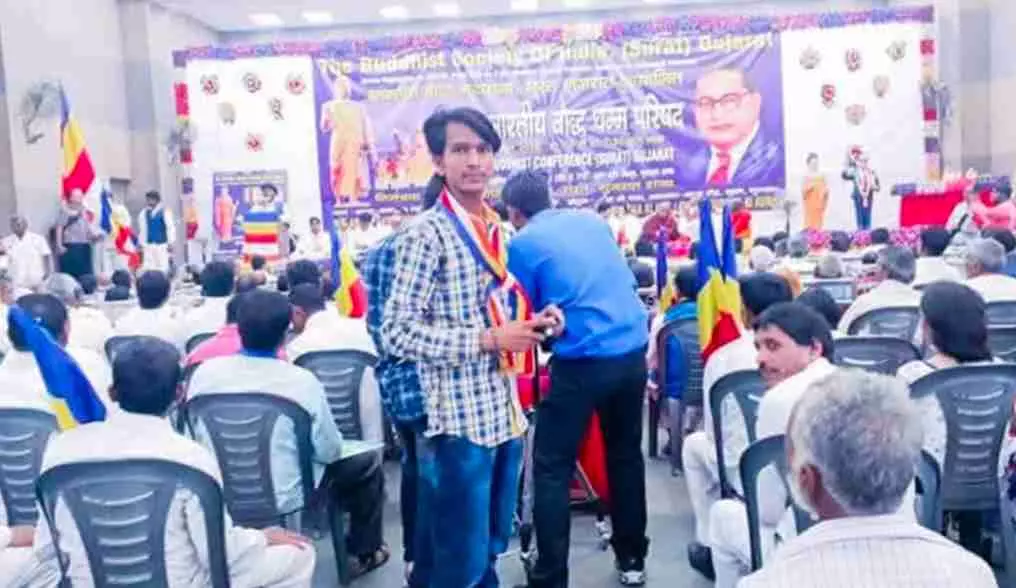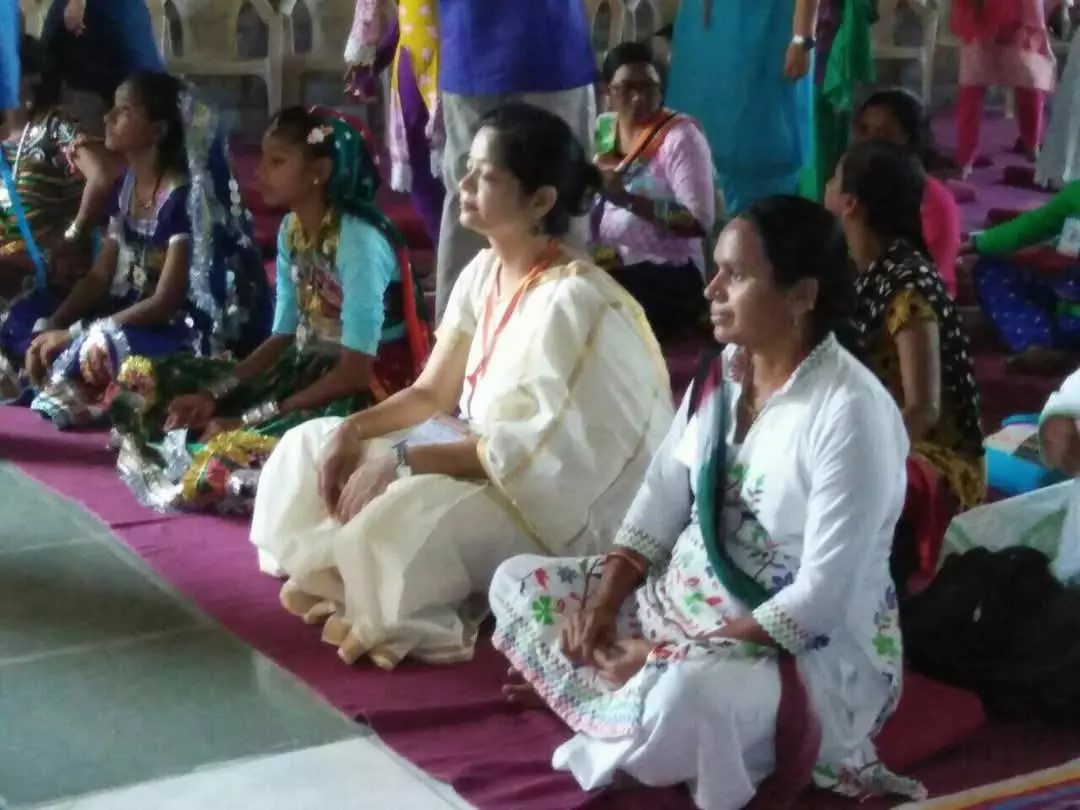
- Home
- India
- World
- Premium
- THE FEDERAL SPECIAL
- Analysis
- States
- Perspective
- Videos
- Sports
- Education
- Entertainment
- Elections
- Features
- Health
- Business
- Series
- In memoriam: Sheikh Mujibur Rahman
- Bishnoi's Men
- NEET TANGLE
- Economy Series
- Earth Day
- Kashmir’s Frozen Turbulence
- India@75
- The legend of Ramjanmabhoomi
- Liberalisation@30
- How to tame a dragon
- Celebrating biodiversity
- Farm Matters
- 50 days of solitude
- Bringing Migrants Home
- Budget 2020
- Jharkhand Votes
- The Federal Investigates
- The Federal Impact
- Vanishing Sand
- Gandhi @ 150
- Andhra Today
- Field report
- Operation Gulmarg
- Pandemic @1 Mn in India
- The Federal Year-End
- The Zero Year
- Science
- Brand studio
- Newsletter
- Elections 2024
- Events
How the road to conversion to Buddhism for 80 Dalit families in Surat was made difficult

On May 14, Jahnvi Solanki, got ready for the most special day of her life. For 29-year-old Solanki, it was the day when her dream was coming true after a two-year-long wait.Jahnvi along with her family of four converted to Buddhism along with 79 other families in Surat on the day. On the day, the 80 Dalit families from various areas of Surat gathered at Anand Buddha Vihar, a Buddhist temple...
On May 14, Jahnvi Solanki, got ready for the most special day of her life. For 29-year-old Solanki, it was the day when her dream was coming true after a two-year-long wait.
Jahnvi along with her family of four converted to Buddhism along with 79 other families in Surat on the day.
On the day, the 80 Dalit families from various areas of Surat gathered at Anand Buddha Vihar, a Buddhist temple in Amroli area of Surat to renounce Hinduism and embrace Buddhism.
Also read | How women in a Gujarat village ushered a water revolution
“It was an emotional ceremony for all of us. I was in tears as I chanted the Buddha Vandana and repeated the 22 vows of Baba Saheb (Baba Saheb Bhimrao Ambedkar). I felt liberated denouncing Hinduism, a religion that gave us nothing but humiliation. Now, I don’t belong to any caste or social hierarchy. We are all equals here,” says Jahnvi, who works as a teacher in a primary school in Surat.

Families gathered for conversion in Amroli
In the ceremony to convert from Hinduism to Buddhism, people are required to chant Bhudha Vandana and then denounce bais barbaadi (22 evils) and take vows devised by Baba Saheb Ambedkar when he converted to Buddhism -
1. Possess the ability to engage in diverse social endeavours,
2. Have the capacity to thwart all forms of antisocial inclinations,
3. Be empowered to disseminate the compassionate and wise teachings of Buddha
4. Be capable of affirming the principles of education, organisation and activism,
5. Foster a cultured ethos within society
6. Eliminate superstition from societal norms
7. Steer society towards a humanistic ethos
8. Safeguard any individuals self-respect
9. Reject anti-Bahujan leadership
10. Ensure the protection rights and interests of all
11. Realise that where there is unity, there is power
12. Promote a sense of brotherhood transcending caste distinctions
13. Foster a sense of a unified and extended family,
14. Understand that only truthful and humane communication will remove derogatory labels from Bahujans
15. Strengthen morale through unity and foster a sense of societal resilience
16. Achieve and implement genuine democracy
17. Finance the construction of educational, medical and residential facilities
18. Establish an orderly and disciplined societal framework
19. Provide a platform for social thinkers to serve as guides
20. Uproot injustice, inequality and oppression
21. Eradicate Manuwad from indigenous communities
22. Understand and practice that all humans are equal
“My family and I have faced discrimination all our lives. My father moved to Surat in search of a job and has worked in the diamond industry for over 20 years. I was a child when I moved to Surat with my mother and my brother was born here. Back in our village, our home was at one end of the village in an area referred to as Valmikivaas (home for Valmiki). We were constantly subjected to discrimination and untouchability. When we moved to Surat, we thought things would change as it is a city and people are more educated. But we have faced discrimination in this city too,” she says.

The journey to embrace a religion of their choice was not easy for the families.
“I remember, when I was in class nine, the teacher gave me average grades in all subjects without checking my papers of half yearly examination. She said she can’t touch something that has been touched by a Dalit. I had to live with that as nothing much was done by school authorities despite complaints,” she adds.
Also read | Private schools snub EWS applicants, send parents on wild goose chase
Fifty-seven-year-old Maheshbhai Maheriya’s family of four also embraced Buddhism on the day.
“I had mentally turned a Buddhist and renounced Hinduism two years back but the formal conversion happened now,” says Maheriya who converted to Buddhism with his wife, son and daughter-in-law.
“There is peace in Buddhism because everyone is alike. Buddhism teaches only peace and compassion. But most importantly it gave us a sense of joy. We are no longer looked down upon by those who think they are superior to us just because they were born to a certain caste considered higher in social hierarchy in Hinduism,” says Maheriya, who works in the Surat Municipal Corporation (SMC).
Red tapism
Noticeably, the journey to embrace a religion of their choice was not easy for the families. The journey began in the year 2023 when the families submitted applications to the district collector to formally adopt Buddhism as per the Gujarat Freedom of Religion Act, 2003.
“Under Gujarat’s Freedom of Religion Act, conversion applications require an applicant to fill three forms – A, B and C. Form A, that has the details of the applicant with the his/her current religion and the religion he/she wants to adopt with reason. The Form A is required to be verified and approved by the district collector within one month. Then the applicant file Form B which is a testimony of certain witnesses who vouch that the conversion is not forced on the applicant. Form B is to be verified and approved within two months unless any irregularity is found. Then the applicant can finally file the Form C, the last form in the process that contains when and where he/she is going to convert and name of the person(s) or organisation who is going to oversee the ceremony. The last form is to be approved within a week to ten days,” said Dinesh Baudh, a member of Swayam Sainik Dal (SSD), a Ambedkerite organisation that helped the families with the process.
“However, the process took more than two years with applications caught between red tapism and bureaucratic delays. For the first six months, we were running between offices to ensure that Form A is accepted by the office of the district collector. After almost a year, they approved the first form. Then we spent another six months running between offices to ensure that the testimony of the witnesses are not rejected. Then, after about three weeks of verifying Form B of each applicant, the issuance of approval letters was stalled as the district collector was transferred. It took another three months for the next official to resume the process,” said Baudh, who embraced Buddhism in 2019 in Nagpur.
Noticeably, around 40,000 applications filed by the SSD and other Dalit rights organisations are pending in various districts.
“The delay did not deter the families from wanting to convert to Buddhism. Instead they waited patiently for two years. It was only after the Surat unit of SSD threatened to sit on an definite dharna in front of the collector’s office that the applications were approved in May 2025,” said Rohit, another member of SSD.
“I don’t think it is just red tapism of the system. The delay only happens when a Dalit seeks permission to convert to Buddhism. We are told the same reasons every time like there is staff shortages or officer is getting transferred. At times the authorities will make a Dalit fill up the form multiple times just because they think the handwriting isn’t clear. The process is exhausting and made long deliberately,” says Manjula Pradeep, a veteran Dalit rights activist from Gujarat who opted to undergo the process in 2020 in Bodh Gaya in Bihar after waiting for her application to get approved in her home state.
“Gujarat has had a history of aggressive caste oppression against Dalits. Why wouldn’t they delay then process in Gujarat? It is after all a powerful act of rejecting of caste oppression and embracing social equality,” Pradeep tells The Federal.
Gujarat freedom of religion act
The Gujarat Freedom of Religion Act, 2003, was brought in to regulate religious conversions by criminalising those done through force, allurement or fraudulent means.
The Act mandates prior permission from the district collector for religious conversions performed by a priest or any religious head.
Under the Act, any religious head, organisation or person found to lure, force or fraudfully convince a person to convert to another religion can be imprisonment up to three years and a fine of up to Rs 50,000.
If the conversion involves a minor, woman, a person of Scheduled Caste or Schedule Tribe, the punishment can go upto four years and a fine of Rupees one lakh can be imposed.
Noticeably, in Amendment in 2021, the Gujarat government introduced an amendment to the Act under section 3A, 4B and 6A.
Section 3A, allows any aggrieved person or a person related to the applicants seeking to convert to lodge an FIR for offences committed under the Act if they doubt that the conversion is not legal.
Section 4A introduced the punishment for conversion through declaring such marriages null and void if conversion takes place before or after said marriage. Under the section, the punishment for every person who is a part of an institution or organisation that participates in unlawful conversions through marriage is imprisonment up to 10 years.
Section 6C places the burden of proving that the conversion did not take place through unlawful means on the accused. Any person can be jailed under the section until proven otherwise in course of legal process.
In July 2021, the Jamiat Ulama-E-Hind challenged the Gujarat Freedom Of Religion (Amendment) Act, 2021 and sought a stay on section 4A as it makes interfaith marriages very difficult within the state.
However, the court ruled in favour of the state government.
